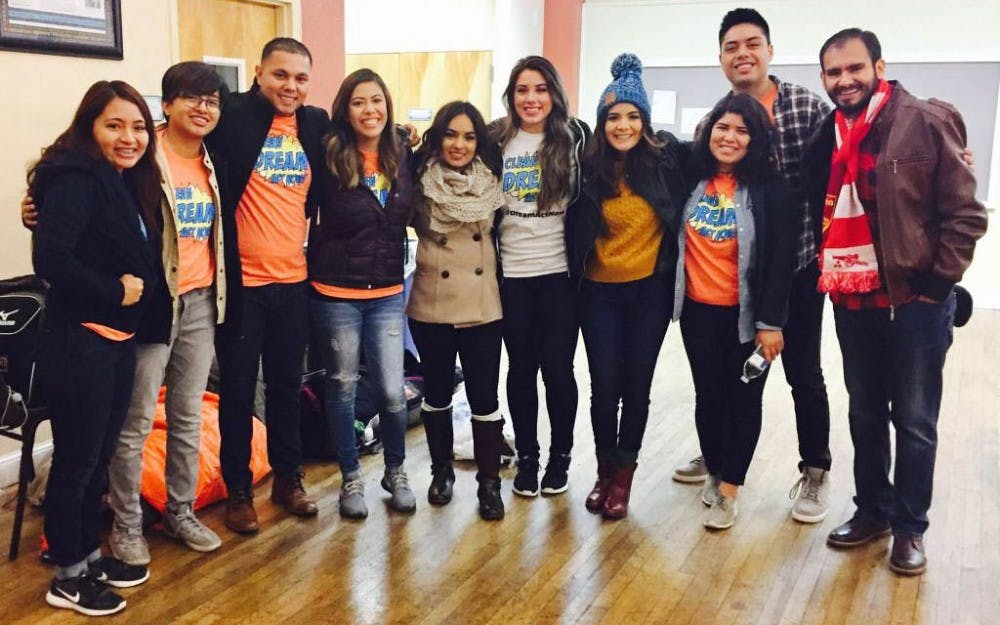In October 2017, Perla Martinez stood in front of a microphone and told her story publicly for the first time. She spoke of moving to America at 5 years old to escape violence and poverty in Mexico. She talked about living in fear of deportation. She was scared to tell her story at first, but she was fueled by her anger at the uncertainty surrounding life as a DACA recipient.
Since the Deferred Action for Childhood Arrivals program was rescinded in September by the Trump administration, DACA recipients across the country have been galvanized into action — hosting protests, marches and sit-ins.
For Undocumented Students for Education Equity member Perla Martinez, an 18-year-old computer science freshman, protesting gives her an opportunity to express her concerns and anger about her uncertain future. The beginning of college marked a turning point for Martinez, as she joined with other DACA students to fight for a "Clean Dream Act."
When Martinez was 5 years old, she moved to Mesa from Mexico City with her mother and brother. Her father had arrived before them to get everything in order. Martinez said she grew up in fear of being separated from her parents but still lived a normal life.
“When I first arrived here, I was just like any normal kid,” Martinez said. “I was going to school, and I didn’t really pay attention (politically) but we’ve always had the fear of (deportation)."
Martinez's older brother didn't have DACA protections — which grant in-state tuition at public universities – and as a result, he couldn't afford to go to college.
“I saw how my brother got depressed because he couldn’t work and he couldn’t go to college,” Martinez said. “And I was like, 'I don’t want that future for me'.”
To avoid a future like her brother’s, she enrolled in all Advanced Placement and dual enrollment classes during high school and joined clubs like the debate team. She researched in-state and out-of-state options for college. She chose ASU, partly because she said the school is "supportive" of DACA students.
Once Martinez got to ASU, she joined USEE and took part in activism, even traveling to Washington D.C. in November to pressure lawmakers to vote on a "Clean Dream Act." She called the experience eye-opening.
“Because sometimes you get the feeling of ‘oh I’m alone,’ but not when you go to these events and you see the people around you that are like me.”
Martinez’s close friend from high school, Catherine De Norio, an ASU freshman studying political science, said Martinez was shy in high school.
“She’s grown from the high school graduate that she was, and she is very vocal and participates actively in her community regarding her situation,” De Norio said.
Though De Norio is not a DACA recipient, she supports Martinez as she becomes more active in the DACA movement.
“I think her reality is way more uncertain now than it was in high school,” De Norio said. “I think that there is a sense of urgency now that has made her become the person that she is.”
Martinez said she joined USEE for the sense of community and the chance to make a difference.
“I wanted to be more informed to what’s going on, instead of just reading it online,” Martinez said. “I would always be home and I was like, ‘I’m kind of tired of the situation and I want to do something about it’ — so USEE was a way for me to do something about it.”
Martinez is strong-minded and passionate, said Korina Iribe, USEE advocacy director and graduate student.
“I think that getting in front of people and sharing your story or advocating in general is sometimes hard, even when you are affected like Perla, but I think that she has really stepped up and shown that unique quality of leadership,” Iribe said.
After Martinez spoke at the October rally for the first time, USEE began to reach out to her more often to speak at protests and rallies.
She said the protests, particularly the one in D.C., were peaceful and organized. Martinez said there was risk of being arrested if the protesters didn’t adhere to the warnings given to them by officials. Once back on campus, Martinez continued conducting tabling events and speaking at local protests with USEE.
After graduation, she plans to get a job with a company like Apple and to start a fund for DACA students to go to college.
“I don’t know if it’s like a crazy dream,” Martinez said. “But I’ve always wanted to help like a foundation or create a foundation to help DACA students be able to go to college.”
Reach the reporter at cmgiulia@asu.edu or follow @tinamaria_4 on Twitter.
Like The State Press on Facebook and follow @statepress on Twitter.




